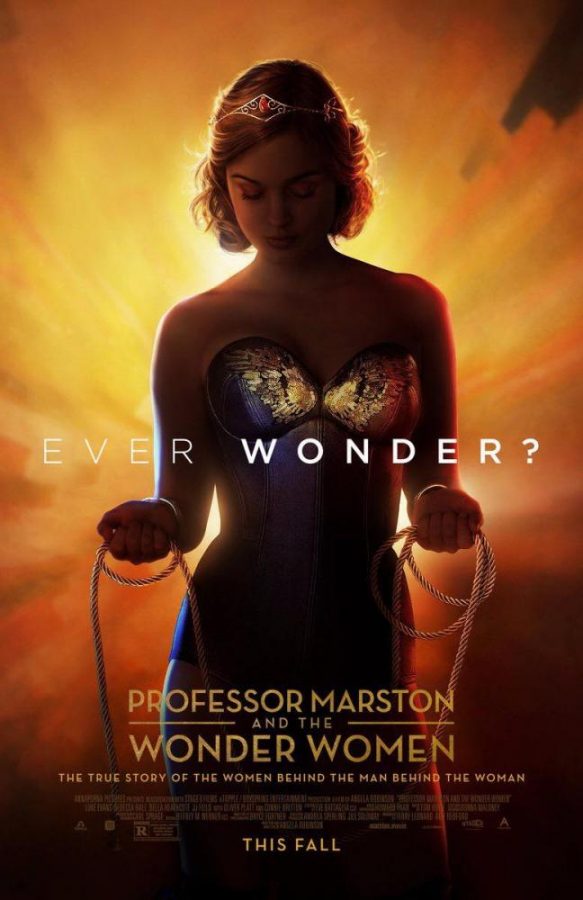The Origin Wonder Woman Deserves
“Professor Marston and the Wonder Woman” follows the life of William Moulton Marston (Luke Evans) and his wife Elizabeth Holloway (Rebecca Hall). The delightfully crass movie covers the origin of Wonder Woman by the Marston’s.
October 10, 2017
If there is one history book that is a must read for comic book fans, it should be “The Secret History of Wonder Woman” by Jill Lepore. Lepore’s 2014 book is an incredible and in-depth look at the philosophical origins of Diana Prince, her radical, scandalous creators and the groundbreaking female politics that helped shape her. When it was announced that a film on the lives of Professor Marston, Professor Holloway and Olive Byrne would be coming out the same year as her first feature film — and the same year as Wonder Woman’s rst feature film — the prospect of seeing the real story of how the character came to be was more exciting than seeing her ctional origin. Despite my unreasonable hype and protectiveness over of the source material, I was simply floored by one of the funniest, most thoughtful and boldest films I have seen all year.
“Professor Marston and the Wonder Women” follows the life of William Moulton Marston (Luke Evans), Harvard professor, co-inventor of the lie detector test and writer who, along with his equally brilliant professor and wife Elizabeth Holloway (Rebecca Hall), puts forward the idea that women are potentially superior than men but are held back by the expectations of housework (the rest of their ideology includes bondage, studying sororities and women ultimately taking over politics). When they begin a polyamorous relationship with student Olive Byrne, the two women’s lives and personalities help create a single vision of the Wonder Woman.
The film is going to be a signature moment in the careers of all three leads, as they all embody these larger-than-life, showy and crass roles. This is Evans’ shining moment, capturing the sharpness, charm, fierce determination and often insufferable pretension that makes him such a compelling figure. The film really isn’t about Marston, but rather the two incredible, brilliant women who made Wonder Woman a reality. This is their story and their connection, and the film creates stunning, rich portraits of both. Hall’s Elizabeth Holloway is the greatest character of 2017. Brilliant, coarse, impassioned and utterly enthralling, she simply engulfs every frame she is in. If Gal Gadot has created a role model for young girls, Hall has created a role model for women, and it would be a travesty if she were left out of the Oscar conversation. While relative newcomer Bella Heathcote isn’t given as showy a role as her peers, she absolutely sparkles as Olive Byrne. She brings a soul, warmth and idealism that allows her to hold her own against two giants and is given some of the most human and stirring moments. If Holloway is the power behind Wonder Woman, Byrne is the soul.
It cannot be overstated how delightfully crass “Professor Marston” is and how it commits to the unorthodox, scandalous tastes and beliefs of the Marstons. Within 20 minutes, the viewer is left beaming at how unafraid of being a romp the film is. One particular moment from the book was surprisingly adapted to the screen, causing the audience’s jaws to hit the floor and creating one of the weirdest, funniest and most sexually charged scenes. And yes, the film radiates sexual energy, making one of the most passionate and sexy films since “The Handmaiden.”
What is most surprising about “Professor Marston” is how confidently and casually it works the fascinating philosophy of the Marstons into the narrative. Much of the film is framed around the various relationship theories Marston taught, and her ideas and theories are worked into dialogue gracefully, never once slowing down the film. This is perfect because “Professor Marston” isn’t about the creation of Wonder Woman, but her origins. It is about the radical feminist philosophy that influenced her creation and ultimately had her censored. It is about the extraordinary women who could inspire such a wonderful hero and who should be remembered today as role models.
This film is undoubtedly a required supplement for older viewers who loved “Wonder Woman,” as it helps firmly cement why her existence is so critical, unexpected and magnificent. Wonder Woman effectively had two matriarchs shaping her existence, so it is only fitting that after 75 years, she gets two great films.
“Professor Marston and the Wonder Women” opens nationwide on Friday, Oct. 13.
A version of this article appeared in the Tuesday, Oct. 10 print edition.
Email Carter Glace at [email protected].
























































































































































